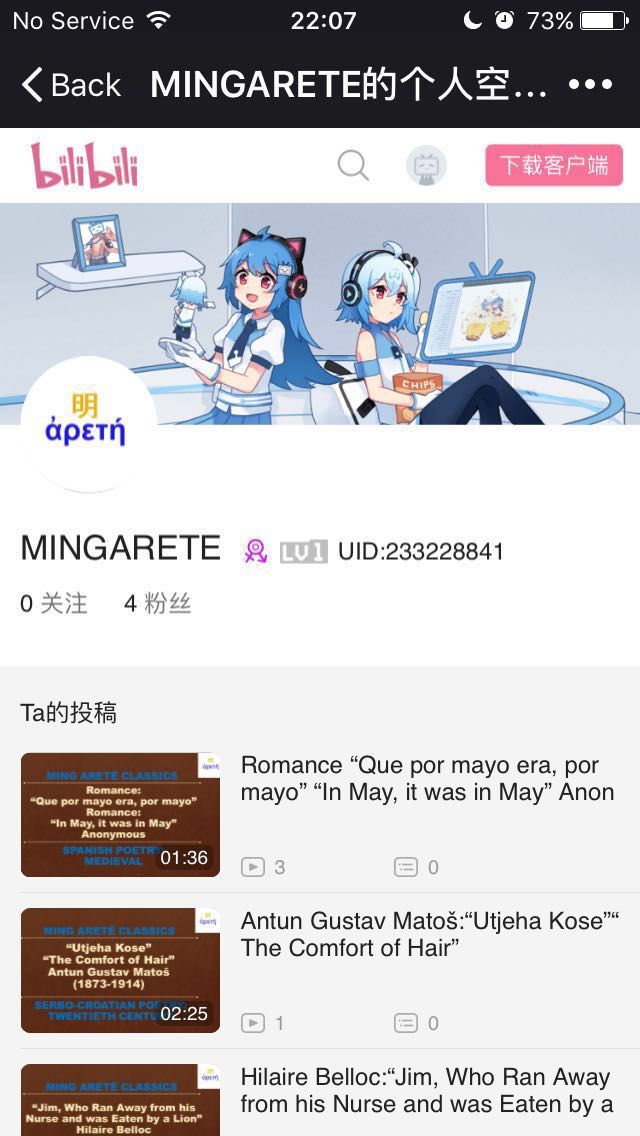The degendering of the third person pronoun in Mandarin, pt. 2
« previous post | next post »
Bilibili (bīlībīlī 哔哩哔哩; B zhàn B站 ("B site / station") "is a video sharing website themed around anime, manga, and game fandom based in China, where users can submit, view, and add commentary subtitles on videos" (Wikpedia). When you register for this site, you're supposed to declare whether you're M(ale) or F(emale), in which case your posts will be referred to respectively as "tā de 他的" ("his") and "tā de 她的" ("hers"). If you do not specify your gender, your posts will be referred to as "ta的" or "TA的", i.e., neither M(ale) (tā de 他的) nor F(emale) (tā de 她的).
Here's a screenshot of a friend's bilibili page showing this usage:
Cf. also:
- "The degendering of the third person pronoun in Mandarin " (12/12/13)
- "Roman-letter Mandarin pronoun of indeterminate gender " (9/9/16)
- "Sweden's gender-neutral 3rd-person singular pronoun " (4/13/17)
- "Gender bending " (10/6/15)
What seems to have happened over the long haul during the last century has been first a gendering of the third person pronoun, then a degendering, then a regendering accompanied by another degendering…. It's enough to make your head spin. But all of that is in the written language: 他她它 ("he, she, it"), etc. In the spoken language, they remain constant: tā.
[Thanks to Alex Wang]

Daniel Barkalow said,
October 16, 2017 @ 3:40 pm
Obviously need a "x也" character, still pronounced tā, where the 人 or 女 radical is replaced with a lowercase Latin x.
JK said,
October 16, 2017 @ 5:03 pm
I suppose another solution would be to go back to the literary Chinese third person pronoun 其 qi2, but that would probably appear strange in the context of modern Internet language
Codrington said,
October 16, 2017 @ 7:43 pm
Personally, I expect the use of 怹 but that's just my humble self.
Michael Watts said,
October 17, 2017 @ 1:28 am
Daniel Barkalow, it seems more logical to introduce a 男也 character than an X也 character. 人 is already gender-neutral.
Ouen said,
October 17, 2017 @ 2:20 am
In addition to 他,她 and 它, Taiwanese mandarin uses 牠 and on some rare occasions 祂
Maybe 祂 could be used as the third gender neutral pronoun because it is so rarely used for its original purpose?
Ouen said,
October 17, 2017 @ 2:28 am
Also there is a Taiwanese talk show called TA們說, it's a talk show about LGBT issues so maybe the gender neutral TA reflects the perspective of someone who identifies as gender non binary
cliff arroyo said,
October 17, 2017 @ 7:41 am
@michael watts…. Exactly! If they wanted gendered pronouns in writing they went about it in a bad, misguided way, the current pair is very bad conceptual design 男也 (scrunched up into one character) is a far better masculine pronoun.
But then fundamental design flaws seem to be everywhere in characters which is one reason that reform is so difficult – fixing one bad feature just highlights how many bad features remain….).
Rodger C said,
October 19, 2017 @ 6:56 am
祂 = He (cap)?
Eidolon said,
October 19, 2017 @ 7:02 pm
The avoidance of 它, despite its lack of gender, is probably due to 它 having a connotation of being not human.
Aylok said,
October 21, 2017 @ 9:13 am
Does Huang Xingtao's book on 她 discuss why 妳 never established itself in the same way?